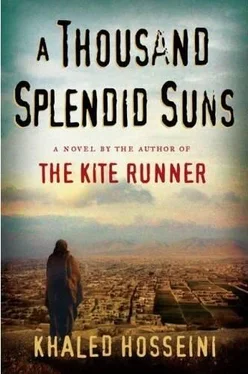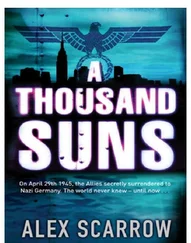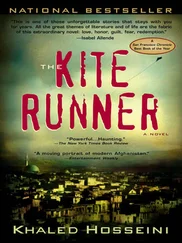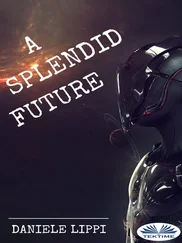"That's the one thing you can't find on Chicken Street." Rasheed laughed
The street was lined with shops and little stalls that sold lambskin hats and rainbow-colored chapans. Rasheed stopped to look at an engraved silver dagger in one shop, and, in another, at an old rifle that the shopkeeper assured Rasheed was a relic from the first war against the British.
"And I'm Moshe Dayan," Rasheed muttered. He half smiled, and it seemed to Mariam that this was a smile meant only for her. A private, married smile.
They strolled past carpet shops, handicraft shops, pastry shops, flower shops, and shops that sold suits for men and dresses for women, and, in them, behind lace curtains, Mariam saw young girls sewing buttons and ironing collars. From time to time, Rasheed greeted a shopkeeper he knew, sometimes in Farsi, other times in Pashto. As they shook hands and kissed on the cheek, Mariam stood a few feet away. Rasheed did not wave her over, did not introduce her.
He asked her to wait outside an embroidery shop. "I know the owner," he said. "I'll just go in for a minute, say my salaam. "
Mariam waited outside on the crowded sidewalk. She watched the cars crawling up Chicken Street, threading through the horde of hawkers and pedestrians, honking at children and donkeys who wouldn't move. She watched the bored-looking merchants inside their tiny stalls, smoking, or spitting into brass spittoons, their faces emerging from the shadows now and then to peddle textiles and fur-collared poostin coats to passersby.
But it was the women who drew Mariam's eyes the most.
The women in this part of Kabul were a different breed from the women in the poorer neighborhoods – like the one where she and Rasheed lived, where so many of the women covered fully. These women were – what was the word Rasheed had used? – "modern." Yes, modern Afghan women married to modern Afghan men who did not mind that their wives walked among strangers with makeup on their faces and nothing on their heads. Mariam watched them cantering uninhibited down the street, sometimes with a man, sometimes alone, sometimes with rosy-cheeked children who wore shiny shoes and watches with leather bands, who walked bicycles with high-rise handlebars and gold-colored spokes – unlike the children in Deh-Mazang, who bore sand-fly scars on their cheeks and rolled old bicycle tires with sticks.
These women were all swinging handbags and rustling skirts. Mariam even spotted one smoking behind the wheel of a car. Their nails were long, polished pink or orange, their lips red as tulips. They walked in high heels, and quickly, as if on perpetually urgent business. They wore dark sunglasses, and, when they breezed by, Mariam caught a whiff of their perfume. She imagined that they all had university degrees, that they worked in office buildings, behind desks of their own, where they typed and smoked and made important telephone calls to important people. These women mystified Mariam. They made her aware of her own lowliness, her plain looks, her lack of aspirations, her ignorance of so many things.
Then Rasheed was tapping her on the shoulder and handing her something here.
It was a dark maroon silk shawl with beaded fringes and edges embroidered with gold thread.
"Do you like it?"
Mariam looked up. Rasheed did a touching thing then. He blinked and averted her gaze.
Mariam thought of Jalil, of the emphatic, jovial way in which he'd pushed his jewelry at her, the overpowering cheerfulness that left room for no response but meek gratitude. Nana had been right about Jalil's gifts. They had been halfhearted tokens of penance, insincere, corrupt gestures meant more for his own appeasement than hers. This shawl, Mariam saw, was a true gift.
"It's beautiful," she said.
* * *
THAT NIGHT, Rasheed visited her room again. But instead of smoking in the doorway, he crossed the room and sat beside her where she lay on the bed. The springs creaked as the bed tilted to his side.
There was a moment of hesitation, and then his hand was on her neck, his thick fingers slowly pressing the knobs in the back of it. His thumb slid down, and now it was stroking the hollow above her collarbone, then the flesh beneath it. Mariam began shivering. His hand crept lower still, lower, his fingernails catching in the cotton of her blouse.
"I can't," she croaked, looking at his moonlit profile, his thick shoulders and broad chest, the tufts of gray hair protruding from his open collar.
His hand was on her right breast now, squeezing it hard through the blouse, and she could hear him breathing deeply through the nose.
He slid under the blanket beside her. She could feel his hand working at his belt, at the drawstring of her trousers. Her own hands clenched the sheets in fistfuls. He rolled on top of her, wriggled and shifted, and she let out a whimper. Mariam closed her eyes, gritted her teeth.
The pain was sudden and astonishing. Her eyes sprang open. She sucked air through her teeth and bit on the knuckle of her thumb. She slung her free arm over Rasheed's back and her fingers dug at his shirt.
Rasheed buried his face into her pillow, and Mariam stared, wide-eyed, at the ceiling above his shoulder, shivering, lips pursed, feeling the heat of his quick breaths on her shoulder. The air between them smelled of tobacco, of the onions and grilled lamb they had eaten earlier. Now and then, his ear rubbed against her cheek, and she knew from the scratchy feel that he had shaved it.
When it was done, he rolled off her, panting. He dropped his forearm over his brow. In the dark, she could see the blue hands of his watch. They lay that way for a while, on their backs, not looking at each other.
"There is no shame in this, Mariam," he said, slurring a little. "It's what married people do. It's what the Prophet himself and his wives did. There is no shame."
A few moments later, he pushed back the blanket and left the room, leaving her with the impression of his head on her pillow, leaving her to wait out the pain down below, to look at the frozen stars in the sky and a cloud that draped the face of the moon like a wedding veil.
Ramadan came in the fall that year, 1974. For the first time in her life, Mariam saw how the sighting of the new crescent moon could transform an entire city, alter its rhythm and mood. She noticed a drowsy hush overtaking Kabul. Traffic became languid, scant, even quiet. Shops emptied. Restaurants turned off their lights, closed their doors. Mariam saw no smokers on the streets, no cups of tea steaming from window ledges. And at iftar, when the sun dipped in the west and the cannon fired from the Shir Darwaza mountain, the city broke its fast, and so did Mariam, with bread and a date, tasting for the first time in her fifteen years the sweetness of sharing in a communal experience.
Except for a handful of days, Rasheed didn't observe the fast. The few times he did, he came home in a sour mood. Hunger made him curt, irritable, impatient. One night, Mariam was a few minutes late with dinner, and he started eating bread with radishes. Even after Mariam put the rice and the lamb and okra qurma in front of him, he wouldn't touch it. He said nothing, and went on chewing the bread, his temples working, the vein on his forehead, full and angry. He went on chewing and staring ahead, and when Mariam spoke to him he looked at her without seeing her face and put another piece of bread into his mouth.
Mariam was relieved when Ramadan ended.
Back at the kolba, on the first of three days of Eid-ul-Fitr celebration that followed Ramadan, Jalil would visit Mariam and Nana. Dressed in suit and tie, he would come bearing Eid presents. One year, he gave Mariam a wool scarf. The three of them would sit for tea and then Jalil would excuse himself "Off to celebrate Eid with his real family," Nana would say as he crossed the stream and waved – Mullah Faizullah would come too. He would bring Mariam chocolate candy wrapped in foil, a basketful of dyed boiled eggs, cookies. After he was gone, Mariam would climb one of the willows with her treats. Perched on a high branch, she would eat Mullah Faizullah's chocolates and drop the foil wrappers until they lay scattered about the trunk of the tree like silver blossoms. When the chocolate was gone, she would start in on the cookies, and, with a pencil, she would draw faces on the eggs he had brought her now. But there was little pleasure in this for her. Mariam dreaded Eid, this time of hospitality and ceremony, when families dressed in their best and visited each other. She would imagine the air in Herat crackling with merriness, and high-spirited, bright-eyed people showering each other with endearments and goodwill. A forlornness would descend on her like a shroud then and would lift only when Eid had passed.
Читать дальше












